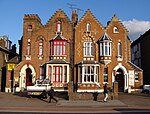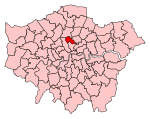Finsbury Park TMD

Finsbury Park TMD was a railway traction maintenance depot situated in London, England. It was the first purpose built main line diesel locomotive depot opened in England and it was fully commissioned in April 1960. Finsbury Park was allocated British Railways depot code 34G under the original alphanumeric system; the two letter code of the depot was FP. The nearest railway station is Finsbury Park. The maintenance shed held six roads. Roads seven to eleven were located to the east, with number ten road also accommodating the breakdown train shed. Additionally there were five roads of stabling in Clarence Yard, which was nearest to the main running lines. The depot was downgraded in June 1981 and closed in October 1983. The site is now covered in residential flats which can be seen to the south-west of Finsbury Park station.
Excerpt from the Wikipedia article Finsbury Park TMD (License: CC BY-SA 3.0, Authors, Images).Finsbury Park TMD
Rixon Street, London Finsbury Park (London Borough of Islington)
Geographical coordinates (GPS) Address Nearby Places Show on map
Geographical coordinates (GPS)
| Latitude | Longitude |
|---|---|
| N 51.5582 ° | E -0.1099 ° |
Address
Rixon Street
N7 7JD London, Finsbury Park (London Borough of Islington)
England, United Kingdom
Open on Google Maps







